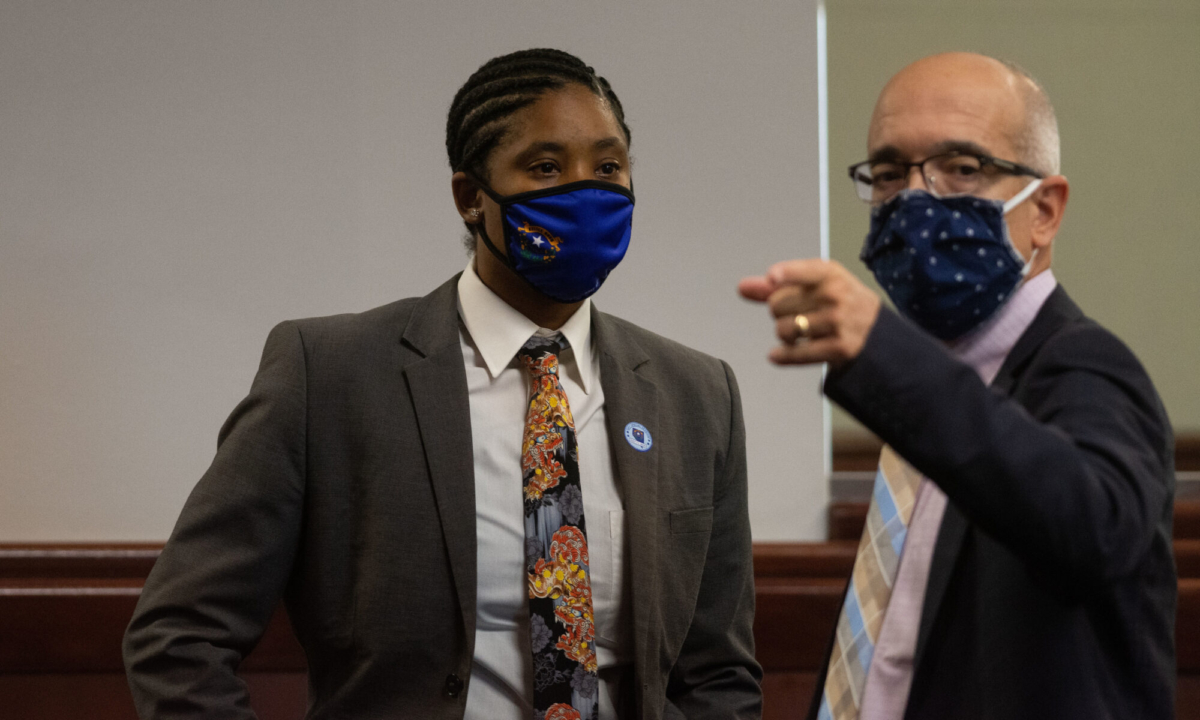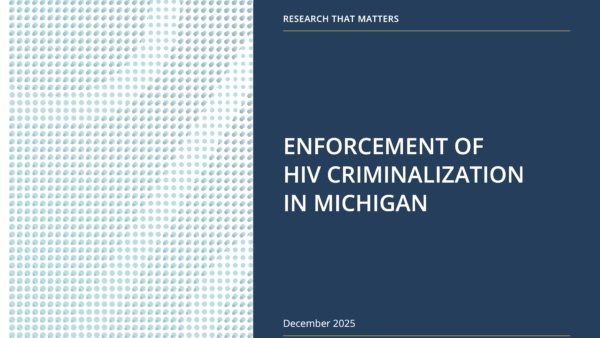
Governor Sisolak Signs into Law Legislation Modernizing Nevada’s HIV Laws
HENDERSON, NV – Nevada Governor Steve Sisolak today signed into law landmark legislation to reform outdated Nevada laws that criminalized and stigmatized people living with HIV. Senate Bill (SB) 275 was introduced by Senator Dallas Harris, received bipartisan support in the Senate, and it was supported by a broad alliance of advocacy groups, public health professionals, civil rights organizations and health care providers including Silver State Equality, Nevada’s statewide LGBTQ+ civil rights organization, and a partner of the Nevada HIV Modernization Coalition.
Senate Bill (SB) 275, introduced by Sen. Dallas Harris, won approval with a unanimous vote in the Nevada Senate and by a 26-15 vote in the Assembly. The bill moved to the Governor for his signature.
On the importance of signing the bill into law Governor Sisolak said:
“Nevada is known as a warm and welcoming place for all– in our State, we celebrate our diversity. I am so grateful to sign legislation to ensure that our LGBTQ+ community feels safe, protected and can continue to grow and flourish in the Silver State. Senate Bill 275, sponsored by Senator Harris and presented in partnership with André Wade and former Senator David Parks, modernizes Nevada’s HIV criminal laws and reestablishes the Advisory Task Force on HIV Exposure Modernization for the 2021-2022 Legislative Interim. We know that laws that criminalize people living with HIV don’t stop the spread, but they actually hurt our public health efforts.”
Silver State Equality released the following statement from State Director André C. Wade:
“Today, Nevada recognizes HIV as a public health issue, not a criminal one. issue. With his signature, Governor Sisolak has moved Nevada HIV laws into the 21st century by aligning them with modern science, ultimately helping to reduce stigma and discrimination against people living with HIV. When people are no longer penalized for knowing their status, it encourages them to come forward, get tested and get treatment. That’s good for all Nevadans. The HIV epidemic will end not by threatening people with criminal prosecution, but instead, by encouraging people to get tested, and by providing them access to care. Today’s signing is especially great news for Nevada communities of color and members of the LGBTQ+ community, who are disproportionately impacted by HIV.”
Senator Dallas Harris, Co-Chair of the Advisory Task Force on HIV Exposure Modernization, said:
“Nevada state law will no longer discourage Nevadans from getting tested for HIV. With the Governor’s signature today, we are helping to reduce the stigma that keeps some from learning their HIV status and getting treatment. I want to thank Governor Sisolak for his actions that are keeping Nevada at the forefront in the fight to stop the spread of HIV. Much work remains to be done, but I’m optimistic that eventually these discriminatory criminal laws targeting those living with HIV will be eliminated throughout the country.”
Statement from the Co-Chairs of the Nevada HIV Modernization Coalition – Connie Shearer, Chris Reynolds, and Stephan Page:
“The Nevada HIV Modernization Coalition members would like to thank Senators David Parks and Dallas Harris for their unwavering commitment to modernizing Nevada’s laws that were stigmatizing and harmful. The passing of SB275 is a great step forward toward ending the unwarranted criminalization of people living with HIV in Nevada and it supports science. This in turn supports and promotes public health for all Nevadans.”
A Statement from Connie Shearer, Co-Chair Nevada HIV Modernization Coalition:
“The Nevada HIV Modernization Coalition members would like to thank Senators David Parks and Dallas Harris for their unwavering commitment to modernizing Nevada’s laws that were stigmatizing and harmful. The passing of SB275 is a great step forward toward ending the unwarranted criminalization of people living with HIV in Nevada and it supports science. This in turn supports and promotes public health for all Nevadans.”
The Elizabeth Taylor AIDS Foundation issued the following statement:
“The Elizabeth Taylor AIDS Foundation salutes Governor Sisolak for signing much needed legislative reform for people living with HIV represented in SB 275. We are grateful for the leadership of Senator Harris in championing this bill. We congratulate the Nevada HIV Modernization Coalition and Silver State Equality for their hard work in achieving this long-awaited reform. With the voice of our founder, Elizabeth Taylor, we stand with all organizations throughout the country who are striving to reform these discriminatory laws. We are appreciative for the opportunity to have been of support in Nevada.”
For more information, visit www.silverstateequality.org/hiv.
Published on May 26, 2021, in GlobeNewsWire
Nevada Legislature Passes Bill to Modernize State’s HIV Laws
Garnering bipartisan support, legislation will fix Nevada’s outdated, ineffective, discriminatory HIV criminal laws.
CARSON CITY, Nev., May 26, 2021 (GLOBE NEWSWIRE) —
Silver State Equality, Nevada’s statewide LGBTQ+ civil rights organization and a partner of the Nevada HIV Modernization Coalition, praised Nevada legislators Wednesday for their bipartisan passage of legislation that modernizes Nevada’s HIV criminal laws.
Senate Bill (SB) 275, introduced by Sen. Dallas Harris, won approval with a unanimous vote in the Nevada Senate and by a 26-15 vote in the Assembly. The bill now moves to the Governor for his signature.
The bill repeals a Nevada statute that makes it a felony for someone who has tested positive for HIV to intentionally, knowingly or willfully engage in conduct that is intended or likely to transmit the disease. Repealing that statute means a person who has contracted HIV and who engaged in such behavior would instead be given a warning as their first offense and, after a second offense, would be guilty of a misdemeanor — a punishment that is consistent with the treatment of other communicable diseases.
The bipartisan show of support impressed HIV activists who have been advocating for years to reform state laws that criminalize HIV with the goal of ensuring they are sync with advances in modern medicine that make transmission of the virus impossible.
Silver State Equality released the following statement from State Director André C. Wade, who — along with Sen. Harris — serves as Co-Chair of the Nevada Department of Health and Human Services’ Advisory Task Force on HIV Exposure Modernization:
“We are extremely pleased with the passage of SB 275 via a strong bipartisan vote. This action will advance the fight against HIV transmission and help to remove HIV stigma that was perpetuated by outdated criminal laws that discouraged disclosure, and thereby testing, treatment and the use of other preventative measures. Even though changing these outdated, ineffective and discriminatory laws is simply common-sense progress, this is a huge move in the right direction. Its passage shows that the years of advocating around this issue are paying off. Our legislators and Nevada citizenry are beginning to understand that the old laws were born out of an era when evidence-based knowledge about HIV risk, transmission and treatment were exceedingly limited. Thank you to the Nevada Legislature, especially Senator Dallas Harris, who authored SB275, and for keeping Nevada at the forefront of LGBTQ+ and civil rights reform.”
Senator Harris, Co-Chair of the Advisory Task Force on HIV Exposure Modernization, said:
“The bipartisan passage of this bill reverses practices that were put in place during the 1980s AIDS epidemic and have proven ineffective and counterproductive from a public health perspective. The old laws also disproportionately affected already marginalized groups, including people of color and LGBTQ+ people. Passage of SB275 helps to remove the statutory stigma that was intentionally placed into our laws that’s done nothing but harm to those who contracted HIV.”
According to a recent report by the UCLA Williams Institute, which analyzed data from the state of Nevada, between 2011 and 2020, arrests for HIV crimes were double the amount from the previous decade and arrests for HIV crimes fell disproportionately on black Nevadans. Black people are 10 percent of Nevada’s population and 28 percent of people living with HIV in the state, but 40 percent of those who have been arrested for HIV crimes.
Connie Shearer, Co-Chair of the Nevada HIV Modernization Coalition said:
“While it’s true that the majority of arrests under HIV criminal laws are reduced or dismissed, the outdated laws continued to perpetuate misinformation and antiquated myths, fears and opinions about HIV and how it is spread. With the passage of SB275, the Nevada Legislature chose science over outdated and irrational fear.”
For more information, visit www.silverstateequality.org/hiv
Published on March 23, 2021 in The Nevada Independent
Democratic Senator seeks overhaul of HIV laws she says will help remove stigma
Sen. Dallas Harris (D-Las Vegas) has introduced a bill that would modernize the state’s laws on human immunodeficiency virus by treating HIV in the same way as other communicable diseases.
The bill aims to reverse practices established decades ago during the height of the AIDS epidemic — when little was known about HIV and AIDS — that have disproportionately affected already marginalized groups, including people of color and LGBTQ+ people.
“The priority for me is equality,” Harris said. “The goal is to remove the statutory stigma that was intentionally placed into our laws all the way across the country that’s done nothing but harm to those who have contracted HIV.”
The bill, SB275, would repeal a Nevada statute that makes it a felony for someone who has tested positive for HIV to intentionally, knowingly or willfully engage in conduct that is intended or likely to transmit the disease. Repealing that statute would mean a person who has contracted HIV and who engaged in such behavior would instead be given a warning as their first offense and, after a second offense, would be guilty of a misdemeanor — a punishment that is in line with the treatment of other communicable diseases, such as chlamydia and SARS.
“These laws were written back in the ‘80s and ‘90s,” said André Wade, chair of the state’s Advisory Task Force on HIV Exposure Modernization. “Whenever there’s a specific call out of HIV, instead of including it as a communicable disease … then that, in and of itself, is stigmatizing.”
Wade, who also serves as the state director for Silver State Equality, an LGBTQ+ civil rights organization, explained that modernizing the laws is important because HIV is treated as though it is different and worse than other communicable diseases, even though it is not.
In 2019, the state’s HIV/AIDS Surveillance Program found that 11,769 Nevadans were living with HIV, with 27.6 percent of that group identified as Black, even though Black Nevadans comprise just 10.3 percent of the state’s population.
Laws criminalizing HIV arose at a time when little was known about the virus and treatment of the disease. However, as medicine has advanced, prevention medications have been created that eliminate the risk of HIV transmission. And public health experts have also learned that the virus does not spread through saliva, tears or sweat, or by hugging, shaking hands, sharing toilets or sharing dishes.
Samuel Garrett-Pate, communications director for Silver State Equality, said that outdated HIV laws have actually made it more difficult to contain the spread of the virus because of the stigma associated with the laws.
“We recognize that not only have these laws not worked to protect people from the transmission of HIV,” Garrett-Pate said. “They’ve actually been counterproductive … They actually discourage testing. They discourage people from learning their status. They discourage people from disclosing their status.”
Harris said she wants to encourage more testing, and an important step in doing that is removing discriminatory language in the law. Her HIV modernization bill includes provisions to update the language around HIV and other communicable diseases and to ensure that people living with HIV are referred to more respectfully in state laws.
Harris also noted the importance of ensuring equality for all through the bill, including for sex workers and inmates. The bill would repeal a Nevada statute that allows for the segregation of inmates who have tested positive for HIV — which would codify into law a directive from a February settlement between the Department of Justice and the Nevada Department of Corrections that banned the segregation practice.
The bill is also aimed at addressing the spread of communicable diseases as a public health matter, rather than through criminalization.
Existing law allows health authorities to take certain action to investigate and control the spread of communicable disease, including ordering a person to be examined for the presence of a disease and ordering the isolation, quarantine or treatment of a person.
The bill would require any such order to include the reasons why the ordered actions are necessary to prevent, suppress or control the communicable disease.
The initiatives come largely from the work of Silver State Equality and the HIV task force.
The task force — established in the 2019 session through SB284, a bill that was sponsored by now termed-out Sen. David Parks (D-Las Vegas) — was created to address stigma surrounding HIV and to update HIV laws in Nevada based on how the public health understanding of the virus has advanced over previous decades.
Since its commencement, the task force has worked to create a report ahead of the current session that includes many of the recommendations realized in Harris’s bill. And with a provision in the bill that would re-establish the task force for the 2021-22 legislative interim, the task force could continue its work on understanding how Nevada’s HIV laws affect those who have contracted the virus.
Wade and Harris both acknowledged that there is more work to be done beyond what made it into the bill, but Wade said he thinks that the bill does most of what he and the task force sought to accomplish.
Harris said she has another bill, SB211, that would require primary care providers to offer STD and HIV testing to anyone aged 15 and older and that would work in tandem with SB275.
“Testing, testing, testing, right. If we learned anything from coronavirus, it’s, ‘go get tested,’” Harris said. “So that’s another piece. I’m hoping that’s going to work together with this modernization bill to break down some of those barriers.”
The HIV modernization bill is scheduled for its first hearing during a meeting of the Senate Health and Human Services Committee on Thursday. Harris said she expects a positive response.
“I expect it to be well received,” Harris said. “The task force has done a lot of the groundwork on this… This is a result of months and months and multiple meetings with law enforcement, with [district attorney] aides, with communities of those who are living with HIV… with our health departments, with all of the stakeholders at the table.”
The Nevada Independent is a 501(c)3 nonprofit news organization. We are committed to transparency and disclose all our donors. The following people or entities mentioned in this article are financial supporters of our work:
$291.76









